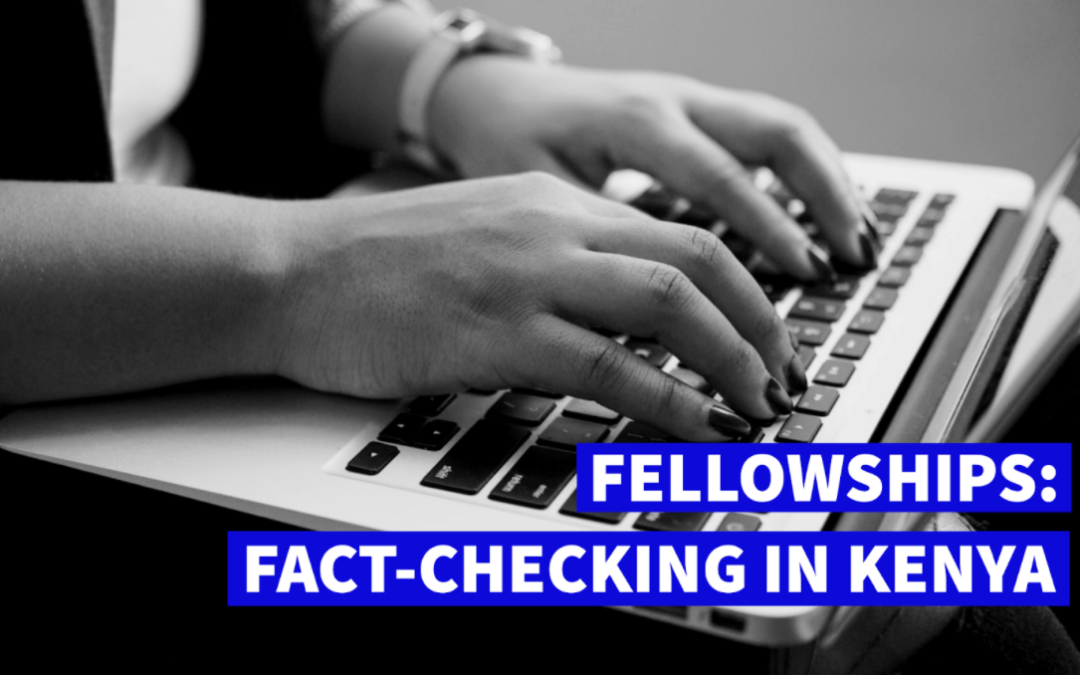Do you want to help fight misinformation, disinformation and hate speech in Kenya?
Code for Africa (CfA) is offering intensive fact-checking fellowships for journalists, newsroom managers and civil society (CSO) researchers in Kenya. Successful applicants will learn fact-checking techniques through hands-on mentorship and project-based learning.
The fellowships are offered in partnership with Deutsche Welle Akademie (DWA) and are open to both freelancers and full-time employees in media or watchdog CSOs in Kenya.
The fellows will be mentored by a team of international experts, supported by Kenyan-based fact-checking professionals. The programme is designed to include a combination of modular step-by-step lessons, alongside one-on-one peer mentoring. Fellows will use their new skills and tools to produce real world fact-checks or newsroom management assignments using CfA’s task-driven ‘learn-by-doing’ model.
Fellows will also be given the opportunity to launch new fact-checking projects for their organisations, with additional technical support from CfA’s team of editorial and technology experts. This team includes senior editors and specialists from Africa’s leading fact-checking organisation, PesaCheck, with teams spread across 14 African countries, including Kenya.
The fellowships:
- Fact-checkers: CfA is offering a four-month, part-time fellowship to active, full-time freelance journalists/researchers, who have the support of an institutional partner (such as a newsroom or watchdog NGO), and pioneering start-up entrepreneurs (in both the non-profit and social enterprise space) and/or strategists/pioneers tasked with setting-up a fact-checking desk for their organisations.
- Newsroom managers: CfA is offering a four-month part-time fellowship for newsroom/institutional managers focused on equipping them with the tools and techniques for setting-up and managing internal production systems for sustainable fact-checking desks/teams or for launching new products/services.
Fellows will learn the following practical skills:
- Fact-checking basics: Understanding fact-checking methodology & taxonomy, and fact-checking techniques, using a range of specialised tools.
- Audience engagement: Understanding how to create unique topics/themes for specific audiences, and how to build audience engagement and feedback systems.
- Production systems: Understanding how to design editorial/research workflow processes, tooling and staffing strategies, for streamlined integration into the host organisation’s wider production processes.
- Policy frameworks: Understanding how to apply international ethical and professional guidelines for quality assurance and industry accreditation, with special emphasis on applying the International Fact-Checking Network’s (IFCN) Code of Principles.
The fellowships are part CfA and DWA’s joint Fighting Disinformation and Misinformation in Kenya: CheckDesk Forensic Data Teams in Newsrooms Networked as a National Observatory initiative. This non-partisan project seeks to expand on the existing ecosystem of fact-checking champions, consisting of newsroom-based desks at partner media, alongside fact-checking startups/non-profit organisations, driven by a community of pioneering changemakers and innovators both within the media and the wider civic watchdog space.
Are You Eligible?
Applicants must meet the following criteria:
- You must be an established journalist/manager in a newsroom, watchdog NGO/social enterprise, or research/policy institute.
- You must commit to publish/broadcast your fact-checks on an appropriate public platform.
- You must be based in Kenya, with demonstrable local experience/insights.
- You must be fluent in English, the language of tuition and mentorship. Your fact-checks may be produced/published in another language, but translated copies must be made available in English.
- You must have access to a home laptop/computer with internet connectivity, to be able to participate in online classes and benefit from the digital mentorship and electronic resources.
- You must commit to attending all classes and completing all lesson assignments during the four months.
- You must have a letter of support from your newsroom manager/editor (if you’re a staff reporter) or a letter of commitment/authorisation from a partner newsroom or publishing partner institution (if you’re a freelancer or CSO researcher), to ensure that your work reaches a meaningful audience.
- You must commit to sharing your new skills and insights within your organisation and wider journalistic/research fraternity, by demonstrating your projects and techniques to peers.
- You do not work for government institutions, state-funded media or paramilitary organisations.
Upon ‘graduation’ you will be inducted into CfA’s pan-African community of professional fact-checkers, with members currently in 21 countries.
The deadline for applications is 30 July 2021.
To apply, complete this form.
Questions? Reach out to our team at hello@codeforafrica.org.
About the Partners:
- Code for Africa (CfA) is the continent’s largest federation of non-profit civic technology and open data laboratories, with full-time staff in 20 African countries, who use open source software and machine learning data science to build digital democracy services that give citizens timely and unfettered access to actionable information that empowers them to make informed decisions and that simultaneously strengthens civic engagement for improved public governance and accountability.
- PesaCheck is currently Africa’s largest (non-profit) fact-checking initiative, with full-time teams in 14 countries (in Burkina Faso, Burundi, Cameroon, Central African Republic, Côte d’Ivoire, Ethiopia, Guinea, Kenya, Mali, Niger, Senegal, Tanzania, Uganda and Zambia). PesaCheck also supports independent CheckDesks in 28 newsrooms across the continent. Together, the network currently produces over 250 fact-checks per month in two international languages (English and French), as well as in Amharic and Swahili, with additional African languages including Oromo and Tigrinya scheduled to launch later this year. PesaCheck’s fact-checking resulted in an average of 400,000/month posts on Facebook being labelled as misleading/harmful, with Instagram, Twitter and Reddit also using PesaCheck reports to identify misinformation on their platforms.
- iLAB is Africa’s largest forensic analysis lab using artificial intelligence (AI) and machine learning (ML) tools to fight disinformation and hate speech across the continent. It has full-time data analysts and cybercrime investigators in eight countries (in Burkina Faso, Côte d’ivoire, Cameroon, Kenya, Nigeria, Senegal, South Africa, Sudan and Zimbabwe), who help expose digital campaigns designed to mislead the public in the run-up to elections and other democratic processes.
Deutsche Welle Akademie (DWA) strengthens the human right to freedom of expression. Together with their partners, they play a leading role in the development of free media systems, creating access to information, setting standards for education and independent journalism.
